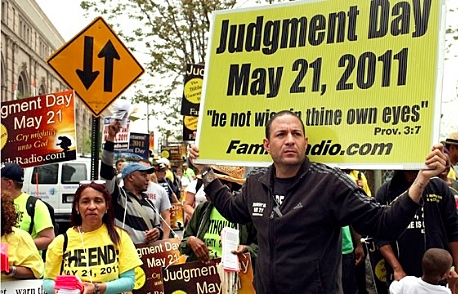It was a year ago today that the world was supposed to end, according to California radio preacher Harold Camping. Of course, when it didn’t happen, he suddenly found new evidence in scripture to support his revised calculations and said the end would come five months later. That date also passed without the world ending.
It’s easy to make fun of a nut such as Camping — and I did my share last year — but there’s a lesson here for anyone who’s so certain of the accuracy of his own beliefs and predictions: Any of us can be wrong. Certainty doesn’t make a person right — and dogged determination to stick to a prediction or position might just mean the person is arrogant and stubborn. (Unfortunately, strident confidence in error is rewarded in politics, while thoughtful candor is punished.)
How did Camping and his followers go so wrong? I’ll never know. Anyone who knows the Bible know that there’s nothing there to make a reasonable person believe he can predict the end of the world. Anyone who tries is simply bringing his own assumptions (and his own arrogance) to bear in order to come up with a date that isn’t there. (If you want to get a heated argument going, ask people from certain Christian groups to get together and compare notes about what’s going to happen when the world ends. Then hide the breakables and get out of the way.)
On the rare occasions when I could get away with disagreeing with my father when I was a kid, he would tend to say, “Well, you just think you’re right.” That statement always puzzled me. Obviously I thought I was right or I wouldn’t hold whatever position I held. Isn’t that true for all of us?
Whatever you believe, you assume you’re right. Otherwise, you’d change your position. So all of us can be guilty of thinking we’re right about everything. It just comes with being human. Since nobody is perfect, what can we do about our blind spots concerning our unknown errors?
The most important thing is to acknowledge that we’re going to be mistaken about some things — and accept that there’s nothing wrong with that. If your ego is on the line every time someone disagrees with you, you’re going to defend your position even when it’s weak, because you’re scared to be wrong. But what if you say this to yourself and others: “This is what I believe is true, but if I find out that someone else is true, I’ll be happy to change my position”? When you do that, you’re less confrontational and you create an atmosphere where people can talk about what the truth is — instead of an atmosphere in which all parties are determined to prove they’re right.
 Your loyalty should be to the truth, not to whatever you might have determined in the past. It doesn’t mean your position on an issue is right. It also doesn’t mean it’s wrong. It just means that you need to have the courage and intellectual honesty to be open to changing your mind. Most people I see aren’t willing to do that.
Your loyalty should be to the truth, not to whatever you might have determined in the past. It doesn’t mean your position on an issue is right. It also doesn’t mean it’s wrong. It just means that you need to have the courage and intellectual honesty to be open to changing your mind. Most people I see aren’t willing to do that.
I’ve thought a whole lot about the things I believe. I have varying degrees of confidence in various things. But I also know that the most truthful thing I can say about many things is, “I don’t know.”
I hope I’m right about everything I believe, but I realize that’s very unlikely. I know I’m wrong about some things. I just don’t know which things I’m wrong about. The only thing I can say for sure is that when you get angry because people disagree with you, you’re probably not as certain about that issue as you’d like to believe.
I don’t want to end up as a humiliated old fool who the whole world is laughing at. I don’t plan to be like Harold Camping. Do you?
I have to give credit to Camping for something I didn’t expect, though. In a move in March that few people noticed, he admitted that he was not only wrong about his predictions, but sinful to use scripture to even try. He might be a nut, but maybe the nut learned a little humility very late in life.

 Life-threatening accident for child puts my tiny problems into context
Life-threatening accident for child puts my tiny problems into context Delusional Democrats help Trump re-election by chasing phantoms
Delusional Democrats help Trump re-election by chasing phantoms Narcissists set themselves up for miserable lives and lonely deaths
Narcissists set themselves up for miserable lives and lonely deaths